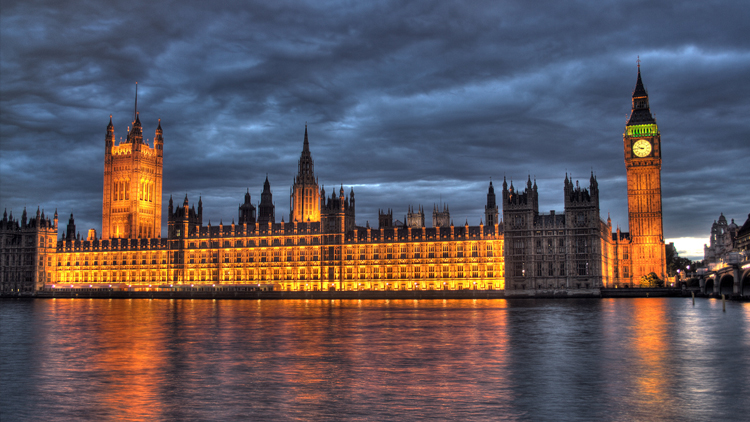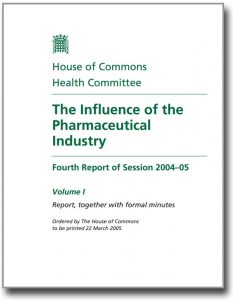Image source: Wikimedia
- Have any questions? Contact us!
- info@dr-rath-foundation.org

A Low Omega-3 Index Is Just As Strong A Predictor Of Early Death As Smoking
July 1, 2021
Study Shows Potential Dangers Of Artificial Sweeteners
July 8, 2021EXPOSED: The Drug Industry’s ‘Hidden Web Of Policy Influence’ In The British Parliament

New research published in the PLOS One journal reveals that the drug industry has a “hidden web of policy influence” in the British parliament. Examining conflicts of interest between the UK’s health-focused All-Party Parliamentary Groups (APPGs) and the drug industry between 2012 and 2018, researchers at the University of Bath discovered that drug companies and drug industry-funded patient organizations had donated a combined total of more than £2 million to the groups – a sum equivalent to over 30 percent of the entire funding received by them across the 6-year period studied. Citing concerns that corporate interests are exploiting their access to APPGs in the UK by turning them into a “dark space for covert lobbying,” the researchers say drug industry funding of these parliamentary groups opens up the possibility of “institutional corruption.”
The PLOS One findings raise important questions about the supposed independence of APPGs in the British political system. Informal parliamentary groups that are run by and for Members of the UK’s Houses of Commons and Lords, APPGs do not receive any parliamentary funding but are able to accept external payments to cover the costs of events, secretariats, travel, reports, and other activities. Given the growing extent to which these groups have become subject to lobbying from multinational business interests, questions are increasingly being asked about their acceptance of corporate funding. Currently, APPGs are subject to very few regulations in the UK regarding their sources of funding.
Funneling money through patient organizations
Overall, a total of 58 health-related APPGs were found to have received 468 payments from drug companies and drug industry-funded patient organizations. Of the 35 drug companies revealed to have been directly or indirectly funding APPGs, the largest donors were Novartis, Bayer, and Pfizer. An APPG focusing on cancer was the biggest recipient of drug company-derived money. The researchers suggest the drug industry’s web of influence in the UK is most dominant in the field of cancer and that the targeted nature of funding directed to APPGs reflects attempts by drug companies to secure commercial benefits.
Significantly, the researchers also note that 50 APPGs received payments from patient organizations that themselves had conflicts of interest. A total of 304 payments worth almost £1 million were made by 57 patient organizations that received over £27 million from drug companies across the 6-year period studied. Patient organizations working in the field of cancer figured prominently among such donors. Commenting on this, the researchers say the drug industry seeks to shape the ideologies of the individuals and institutions it funds, often at the expense of patient health outcomes. They also describe how, by allowing drug company funding of APPGs, public health policymaking in the UK is at risk of being influenced by the drug industry’s goal of maximizing profits.
The influence of the pharmaceutical industry
As the UK is one of the world’s leading pharmaceutical exporting nations, we probably shouldn’t be surprised to learn it has a “hidden web of policy influence” within its parliament. What is arguably more surprising however is that the British government has long been fully aware of the pervasive influence of the pharmaceutical industry on the practice of medicine and healthcare but has essentially chosen to do nothing about it.
Proof of this can be found in a little-known report published in July 2005 by a departmental select committee appointed by the British House of Commons. Entitled ‘The Influence of the Pharmaceutical Industry,’ the report damningly found that the UK’s health regulatory system, medical profession, and government had all failed to ensure that the activities of drug companies were allied to the interests of patients. Citing safety concerns and the increasing problem of drug-induced illness, the report openly criticized the pharmaceutical industry’s failure to put the health of patients before the interests of its shareholders. Nevertheless, despite also recognizing that there is too little independent research comparing drug and non-drug approaches to treatment, the report was essentially buried, and its recommendations largely ignored.
Ultimately, of course, the drug industry’s “hidden web of policy influence” extends far beyond the confines of the British parliament. Politicians in other major pharmaceutical exporting countries are similarly showered with regular funding derived from the ‘business with disease’. In 2020, for example, more than two-thirds of the entire membership of the US Congress received campaign funding from the drug industry. Of the 20 senators and 20 representatives who received the most contributions, 39 belonged to committees with jurisdiction over health-related legislative matters, 24 of them in senior positions. Eliminating such conflicts of interest and the corruption they engender remain among our biggest barriers to achieving ‘Health for All.’




